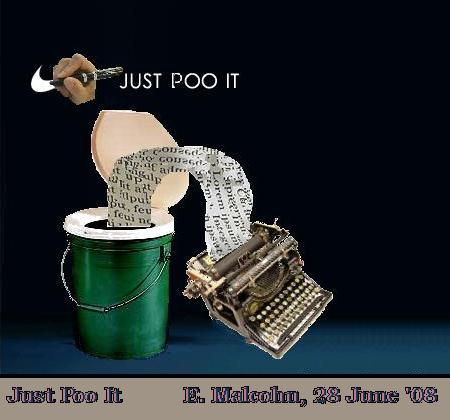Blurred Vision

Collage component credits:
Steven Kovar's blog provided the Nike slogan and background.
Miguel Helft's May 30, 2007, New York Times article on pen computing provided the writing hand.
The Classic Typewriter Page, maintained by Richard Polt, provided the Underwood.
Campmor.com provided The Reliance Luggable Loo® Portable Toilet, to whose sterling quality I can personally attest. And finally...
The Lorem Ipsum Bracelet -- which is almost enough to make me want to be the jewelry-wearing type -- provided the toilet paper.
Constructed with MS Paint and MS Photo Editor. Tied in with this week's Sunday Scribblings theme, "Vision."
Sometimes ya just gotta write a whole lotta crap to get to the good stuff. (More)....
Around 25 years ago I attended a panel at a science fiction convention, probably Boskone (New England's regional SF convention). Authors were on the dais, I was in the audience. I forget the panel topic, but at some point my hand went up and I stated my problem, which was that my voice was changing and I had no idea what to do about it.
The short definition of "voice changing" was that everything I wrote came out crap. I couldn't get a handle on how to translate vision into expression. I likened it to the problems faced by adolescent boys before their voices finished dropping. One moment that smooth tenor or baritone finally felt within reach, the next moment everything came out squeaky.
The authors on the dais said, "Just keep writing." Period.
At the time -- I was in my mid-20s -- the answer seemed dismissive and not a little bit smug (to me the panelists seemed to say, "Go 'way, kid, yer botherin' me"). I've related this incident several times now, sometimes while on a dais, myself. Because as put-off as that answer sounded, those authors were right. When I get to my reaction back then, I can see some people in my audience nodding. But then I hit them with the wisdom of the answer, and I try to do it in a way that is inclusive and inviting:
Yes, you will write crap. Crap is good. Crap will ultimately take you where you want to go, if you keep at it and have faith in it, even when it frustrates the bejeezus out of you. And (probably the most important message of all) -- you are not alone.
A little over a year ago, while still working on its prequel, I started drafting the seventh and final Deviations volume. Right now I estimate I have six major scenes left to write in the first draft. Sounds like I'm almost home, right? Just six little scenes and I'm done.
Not.
Those six scenes must convey several critical events (including the climax) and the passage of time in a way that doesn't give my reader whiplash. I must find ways to bridge them so that they progress smoothly, but at the same time I don't want to pad my narrative with unnecessary filler. Then there's conveying the information itself in ways that have the most dramatic effect. Whose point of view do I use, which setting, what choreography?
Sometimes all those variables fall into line fairly easily. My vision is clear. I commune with my characters so that their voices feel authentic to me as I pound out the draft. The scenes march one after the other in an orderly fashion. At those times I am "in the zone."
Most times, I write crap. Not just once, but over and over again. Not because I want to, but because I have to, tearing my hair out until that moment when my "Aha!" realization dawns and I realize, with utter clarity, that the scene was meant to be written this way. I wrote over 11,000 words of crap in the third volume before I got a scene down the way I wanted it. In the fourth volume, after several awful renditions of one particular scene, I finally skipped ahead and wrote the aftermath, and only then did I realize what I had to do with the preceding material.
One of my students is currently engaged in world-building, writing notes about her characters and their environment. She didn't think she was getting anywhere with it, because it seemed to her as though she was addressing the same points over and over, from different angles. I assured her this was a good thing, because it's informing her draft, regardless of what does and doesn't get into the actual story. (It is crucial, of course, to also write the actual story.)
I write voluminous notes. I've got a roughly 5,500-word story coming out (I'll pipe up when I know when), whose notes number more than 9,000 words, few of which actually made it into the draft. It sounds like a waste of time, energy, and disk space, but for me it's golden. All that research has helped me translate what I wanted to say into a few crucial lines or paragraphs. For me, drafting a story is like performing successive distillations, boiling liquid down from an aimless slosh into something with the flavor and consistency needed to make it tasty and nutritious.
And, like thrice-distilled blackstrap molasses, the process can be agonizingly slow.
My current work is progress is bloated, and it's going to get more bloated before I'm done with the first draft. My pacing is about as tight as a dead bungee cord. I've got stretches of yawning narrative to be tightened and re-tooled. My job is to write a heap o' crap and then carve it down here/build it up there/tweak it/twist it/polish it into something manageable and, er, readable. The bloat comes from my free-associating up the wazoo (oooh, patterns!), and then my characters grab their new idea-balloons and go splashing through puddles before I can catch them. And since they're usually right, I let them have their fun with me until the end of the draft, when I get to see what balloons need popping and which characters have to cry.
Not everyone subscribes to this method. Put ten writers in a room and you'll get at least ten different writing techniques. I say "at least" because my own techniques can change depending on the particular story; one size does not fit all even within a single author. One of my favorite "how to" books is Naomi Epel's The Observation Deck because it contains real-life stories of how dozens of "name" authors have struggled with their craft -- including writing and then scrapping hundreds of pages worth of draft.
I love my crap. I've kept drafts of stories I wrote from when my voice was changing. I can't make heads or tails of them. Truly, they are not fit to be seen, but I love them anyway, with some perverse sentimentality. I love the crap I'm writing now, even though it's driving me nuts, if for no other reason than because I'm writing it and will slash and burn great gobs of it so that I can end up with something pretty, somewhere down the line.
As Natalie Goldberg said in Writing Down the Bones: "It is odd that we never question the feasibility of a football team practicing long hours for one game; yet in writing we rarely give ourselves the space for practice. When you write, don’t say, 'I’m going to write a poem.' That attitude will freeze you right away. Sit down with the least expectation of yourself; say, 'I am free to write the worst junk in the world.' You have to give yourself the space to write a lot without a destination."
So Just Poo It. It's okay. It's fertilizer and it has the potential to grow marvelous things. And, at the end of the day, it's good sh*t.
 | Covenant, the first volume in the Deviations Series, is available from Aisling Press, and from AbeBooks, Amazon, Barnes and Noble, Book Territory, Borders, Buecher.ch, Buy.com, DEAstore, libreriauniversitaria.it, Libri.de, Loot.co.za, Powell's Books, and Target. The Deviations page has additional details. |











1 Comments:
great encouragement - i needed that, thank you!!!
Post a Comment
<< Home